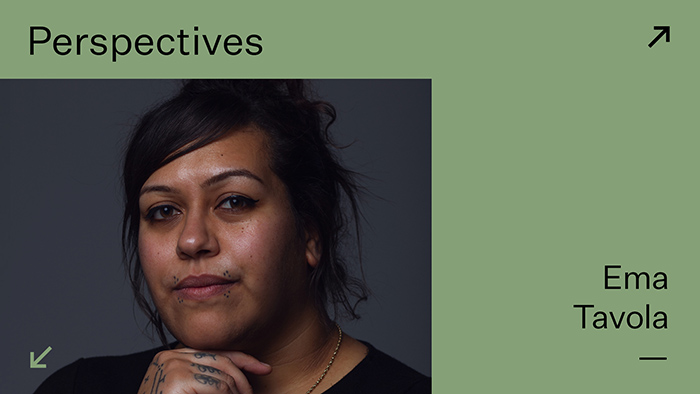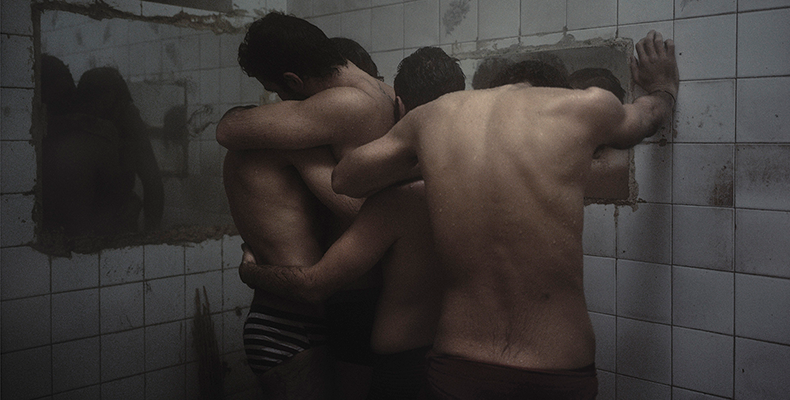Event details
07 May - 19 October 2019

Hear from some of the leading cultural minds of our time in Perspectives, an initiative developed by The Bob Hawke Prime Ministerial Centre, ACE Open and Guildhouse. This series of thought-provoking lectures invites leading artists, makers and cultural thinkers to Adelaide to engage with compelling ideas currently shaping our world.
Leading the program in 2019 was acclaimed photographer Hoda Afshar. Having recently won the $30,000 William and Winifred Bowness Photography Prize with her portrait of Berhouz Boochani, and exhibited at the MCA’s Primavera 2018 with the moving work ‘Remain’, made on Manus Island in collaboration with Boochani, Afshar will discuss the connection between images and representation, and asks how the medium of photography might be used to untangle them.
Arts and cultural tourism academic Adrian Franklin introduced the concept of the anti-museum, document its conceptual history since the eighteenth century, and identify its increasing relevance and presence to contemporary art today. Franklin’s book The Making of MONA was published in 2014, with forthcoming titles set for publication through Routledge and Sydney University Press across 2019-20.
New Zealand based artist and curator Ema Tavola will round out the series (Saturday 19 October), reflecting on aspects of her practice including curating as a mechanism for social inclusion, its potential to shift representational politics and exhibition making as a mode of decolonisation.
Perspectives: shaping the world through visual culture.
Speakers from the 2020 Program include David Capra, Alison Kubler and Jes Fan. The 2021 Program presented, Hayley Millar Baker, Lisa Havilah and Hannah Presley.
EMA TAVOLA
IS THE GALLERY ENOUGH?
SATURDAY 19 OCTOBER, 10 - 11.15AM
BRADLEY FORUM
ACCESS VIDEO HERE
Level 5, Hawke Building - UniSA City West campus, 55 North Terrace, Adelaide
Presented by The Bob Hawke Prime Ministerial Centre, ACE Open and Guildhouse
New Zealand-based independent artist and curator Ema Tavola unpacks power and privilege in the South Pacific through the lens of the art world.
With the unbalanced power dynamic of the arts ecology ever-visible, and the experiences of art world Othering becoming increasingly clear, Tavola argues that moves to diversify arts programming are too often tokenistic and rarely representative of systemic change. Instead, confronting disturbing truths and creating space for uncomfortable conversations is a necessary part of challenging the value system and institutionalisation of arts and culture in the colonised South Pacific.
By considering the complex anthropology of race, class, intellectualism and privilege that is embedded within gallery walls, Tavola reflects on 15 years of practice-based research to discuss how enabling the genuine presence of Pacific art, artists and audiences in institutions is not a radical act, but rather a conscious decolonisation of the Gallery and its potential.
EMA TAVOLA, WRITER AND CURATOR
Ema Tavola is an independent artist-curator based in South Auckland, New Zealand. Having established her practice whilst managing Fresh Gallery Ōtara, a local government funded community art gallery, Tavola’s curatorial concerns are grounded in the opportunities of contemporary art to engage grassroots audiences, shift representational politics and archive the Pacific diaspora experience. Tavola has worked in galleries and museums throughout New Zealand and is committed to curating as a mechanism for social inclusion, centralising Pacific ways of seeing, and exhibition making as a mode of decolonisation.
Recent projects include, A Maternal Lens (2018) for the 4th International Biennial of Casablanca (Morocco), Kaitani (2017) for The Physics Room (New Zealand), Dravuni: Sivia yani na Vunilagi – Beyond the Horizon (2016/2018) for the New Zealand Maritime Museum and Oceania Centre for Arts, Culture and Pacific Studies, University of the South Pacific (Fiji).
|
This event is presented as part of Tarnanthi: Festival of Contemporary Aboriginal and Torres Strait Islander Art and will be Auslan-interpreted
![]()
PROFESSOR ADRIAN FRANKLIN
ANTI-MUSEUMS AND THE CONTINUING CRISIS OF ART EXHIBITION
TUESDAY 16 JULY, 6PM - 7.30PM
A podcast is unavailable for this presentation
Level 5, Hawke Building - UniSA City West campus, 55 North Terrace, Adelaide
Presented by The Bob Hawke Prime Ministerial Centre, ACE Open and Guildhouse
In this presentation, renowned sociologist and design expert Adrian Franklin introduces the concept of anti-museum, documents its conceptual history since the eighteenth century, and identifies its increasing relevance and presence in contemporary art since its rise in the mid-late twentieth century. Using global examples from Mona, Hobart, The New Museum, New York and Art42, Paris, Franklin will present his insightful research into the structure, influence, value, engagement and impact of anti-museums around the world.
PROFESSOR ADRIAN FRANKLIN, UNIVERSITY OF SOUTH AUSTRALIA
Adrian Franklin, currently Professor: Creative Industries and Cultural Policy at the School of Creative Industries, University of South Australia, trained in social anthropology in the UK and held Professorial positions in the UK, Europe and Australia. His research interests include the sociology of art museums and art publics; urban studies; design; contemporary social theory; travel, tourism and the creative industries. Recent books include The Making of MONA (Penguin); City Life (Sage); Tourism (Sage). New books include Animal Theory (for Sydney University Press) for 2019 and Anti-Museum (Routledge) for 2019. Franklin has forthcoming and recently published articles in The Journal of Festive Studies, Tourist Studies, Journal of Sociology, Museum and Society, The Sociological Review and Annals of Tourism Research.

HODA AFSHAR
UNMAKING IMAGES: IMAGE-MAKING AND REPRESENTATION
TUESDAY 7 MAY, 6PM - 7.30PM
ACCESS VIDEO HERE
Presented by The Bob Hawke Prime Ministerial Centre, ACE Open and Guildhouse
In this lecture, Hoda Afshar discusses the connection between images and representation, and asks how the medium of photography might be used to untangle them. Retracing the history of her own practice, Afshar recounts how the camera has served her as a tool for exploring issues of identity and marginality, both as a documentary photographer in Iran, and as part of her visual-art practice after migrating to Australia.
Focussing on the themes and approach of her most recent series, ‘Behold’, recently shown at Melbourne’s Centre for Contemporary Photography, and ‘Remain’, made on Manus Island in collaboration with Berhouz Boochani and recently exhibited as part of the MCA’s Primavera 2018, Afshar explains how her concern to share the stories of others has necessarily overlapped with her questioning of the limits of image-making, all the while acknowledging its real potential to reshape how we see the world.
Perspectives: shaping the world through visual culture.
HODA AFSHAR
Hoda was born in Tehran, Iran (1983), and is now based in Melbourne, Australia. She completed a Bachelor degree in Fine Art– Photography in Tehran, and recently completed her PhD thesis in Creative Arts at Curtin University. Through her art practice, Hoda explores the nature and possibilities of documentary image-making. Working across photography and moving-image, she considers the representation of gender, marginality and displacement.
In her work, Hoda employs processes that disrupt traditional image-making practices, play with the presentation of imagery, or merge aspects of conceptual, staged and documentary photography. Hoda’s work has been widely exhibited both locally and internationally and published online and in print. She's also a member of ‘eleven’, a collective of contemporary Muslim Australian artists, curators and writers whose aim is to disrupt the current politics of representation and hegemonic discourses.
Hoda Afshar website
Instagram: @hodaafshar

Image credit: Hoda Afshar, Untitled #4, from the series 'Behold' 2016, courtesy of the artist
|
While the views presented by speakers within The Bob Hawke Prime Ministerial Centre public program are their own and are not necessarily those of either the University of South Australia or The Bob Hawke Prime Ministerial Centre, they are presented in the interest of open debate and discussion in the community and reflect our themes of: Strengthening our Democracy -Valuing our Diversity - Building our Future.
The copying and reproduction of any transcripts within The Bob Hawke Prime Ministerial Centre public program is strictly forbidden without prior arrangements.
While the views presented by speakers within The Bob Hawke Prime Ministerial Centre public program are their own and are not necessarily those of either the University of South Australia, or The Bob Hawke Prime Ministerial Centre, they are presented in the interest of open debate and discussion in the community and reflect our themes of: Strengthening our Democracy - Valuing our Diversity - Building our Future. The Hawke Centre reserves the right to change their program at any time without notice.







